Drinking coffee can help reduce chronic inflammation and prevent various diseases.
Follow the caf é (Wechat official account vdailycom) and found that Beautiful Cafe opened a small shop of its own.
In recent years, many studies have found that coffee is good for antioxidants. Researchers at Stanford University in the United States studied the blood samples of 100 young and old people and analyzed their daily life and eating habits. Generally speaking, the inflammatory genes in the elderly are more active, and they are also prone to a variety of chronic diseases, such as hypertension, heart disease, etc., but studies have found that not all elderly subjects have active chronic inflammatory responses in their blood.
The analysis found that the common point of the elderly with fewer inflammatory genes is that they all have the habit of drinking coffee. The more coffee they drink, the lower the active heart of the inflammatory gene. Among them, the inflammatory gene who drinks more than 5 cups of coffee a day is the lowest. Compared with the elderly with high degree of inflammation, the possibility of suffering from hypertension is only 1 / 8.

Drinking three to four cups of coffee a day reduced the risk of death among Japanese between the ages of 40 and 69 by 24%. All these suggest that coffee has a significant anti-aging effect and helps to prevent age-related diseases.
A Japanese study found that drinking coffee can provide a variety of anti-aging benefits. The study, conducted by the Tokyo Institute of Geriatrics, Tokyo Medical College and Dental University, focused on lipid metabolism, energy metabolism and exercise in older mice, which were randomly divided into two groups: one group was fed regular coffee and the other group was fed non-caffeinated coffee.
The results showed that mice who drank regular coffee increased their exercise and energy consumption, and even increased their intake of food and water. Other studies have shown that the positive effects of caffeine on mice include improving insulin resistance and strengthening skeletal muscle grip strength. In addition, whether the mice drank regular or non-caffeinated coffee, levels of adenosine triphosphate (ATP) associated with anti-aging increased in their livers, while plasma free fatty acid levels decreased.
With regard to the potential effects of coffee on humans, studies have shown that caffeine can prevent fatty liver, coffee polyphenols have antioxidant activity, can prevent the oxidation of DNA, protein and fat.
Important Notice :
前街咖啡 FrontStreet Coffee has moved to new addredd:
FrontStreet Coffee Address: 315,Donghua East Road,GuangZhou
Tel:020 38364473
- Prev

Will different coffee filter cups affect the flavor of coffee?
Following caf é comments (official Wechat account vdailycom) found that when a beautiful cafe opened its own shop to make coffee, the concentration was related to the extraction rate, so will different coffee filter cups affect the flavor of the coffee? The filter cup is a funnel-shaped prop filled with coffee for extraction. It was invented by Melitta Bentz in Germany in early 1900. At first, it was in a metal can.
- Next

Reveal the 15 secrets behind the coffee
Following Cafe Review (Wechat official account vdailycom) found that the good coffee in Beautiful Cafe opened its own small shop with mellow taste and long aftertaste. The following editor will reveal 15 little secrets behind the coffee. Let's take a look. 1. It's a pity that coffee is the second largest commodity in the world. Coffee lost to oil. two。 Coffee loses 70% of its flavor in two minutes. According to the official coffee
Related
- Beginners will see the "Coffee pull flower" guide!
- What is the difference between ice blog purified milk and ordinary milk coffee?
- Why is the Philippines the largest producer of crops in Liberia?
- For coffee extraction, should the fine powder be retained?
- How does extracted espresso fill pressed powder? How much strength does it take to press the powder?
- How to make jasmine cold extract coffee? Is the jasmine + latte good?
- Will this little toy really make the coffee taste better? How does Lily Drip affect coffee extraction?
- Will the action of slapping the filter cup also affect coffee extraction?
- What's the difference between powder-to-water ratio and powder-to-liquid ratio?
- What is the Ethiopian local species? What does it have to do with Heirloom native species?

